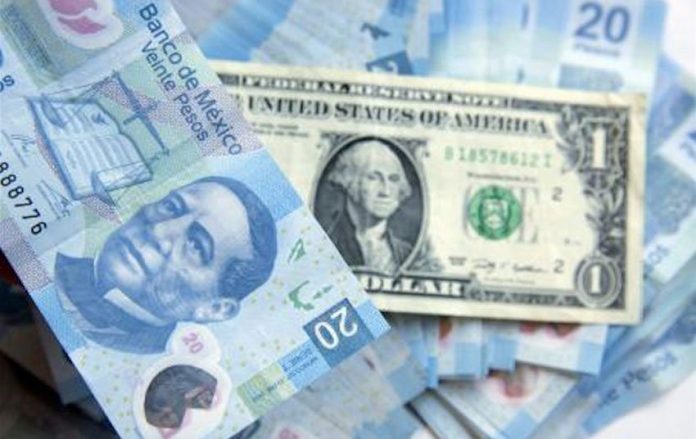The federal government’s first budget has been described as fiscally prudent and realistic by many financial analysts although with reservations in some cases, while others have been less enthusiastic in their assessment.
Finance Secretary Carlos Urzúa presented the 5.8-trillion peso (US $288-billion) 2019 Economic Package on Saturday, pledging to deliver a surplus of 1% of GDP next year while increasing spending on welfare and infrastructure projects and not introducing any new taxes.
“There was a general feeling that it was very difficult to balance spending on social programs without a deficit increase but with this economic package proposal, [President] López Obrador fulfills his promise to be fiscally responsible,” Banorte chief economist Gabriel Casillas told the newspaper El Financiero.
He said that market reaction to the budget would be positive within a context of investor uncertainty following the government’s decision to cancel the US $13-billion Mexico City airport project.
Héctor Villareal, general director of economic think tank Ciep, said the budget was realistic and that the 2019 revenue forecast – 5.3 trillion pesos, mainly from taxes and oil income – was in line with that seen this year.
However, he added that that the government’s planned expenditure would result in a significant decrease in fiscal space.
“Between increases to debt service payments . . . an increase in pensions and the commitment of a primary surplus of 1% of GDP along with not raising taxes . . . the reduction to fiscal space was very radical,” Villareal said.
BBVA Bancomer chief economist Carlos Serrano described the budget as “a responsible package that should result in debt, as a percentage of GDP, staying stable in 2019,” adding “it should be well-received by markets.”
Gabriela Siller, chief economist at Banco Base, noted that the government had acted realistically by reducing its growth forecast to 2%, which is close to market outlooks.
“We expect growth of 1.8% . . . due to a slowing down of investment and probably consumption,” she said.
López Obrador had said previously that his government would target 4% growth.
Another chief economist, Mario Correa of Scotiabank, said the budget “looks reasonable with respect to its macroeconomic assumptions and it seems effectively oriented towards fiscal discipline and macro-stability.”
Raúl Feliz, an economist at CIDE, a Mexico City university, said that markets should be buoyed because “there’s no really crazy stuff” in the government’s spending plans.
Credit Suisse economist Alonso Cervera said that “Urzúa stuck to his 1% primary surplus target even though the context kept on changing with a worsening economic outlook, higher rates and a weaker peso.”
He added that “markets would have been very disappointed had he lowered it.”
However, Cervera said the money set aside for “priority projects” such as the Maya Train and the youth apprenticeship scheme appeared to be too low.
“The question is, in future years, how will they fund them? Will they have enough money without increasing or introducing new taxes?” he pondered.
He also said that he anticipated economic growth of 1.2% in 2019, compared to the budget’s forecast of 2%, and questioned whether investment in state oil company Pemex would be enough to increase oil production by 600,000 barrels a day as López Obrador has pledged to do by the end of his six-year term.
Benito Berber of investment bank Natixis said that after the public consultation on the airport, which resulted in its cancellation, Urzúa slightly increased the surplus estimate to 1% from a previously anticipated 0.8%.
“They wanted to do something about their lack of credibility in the market, the peso depreciation and [bond] yields going up . . . it was very important that they delivered on that,” he said.
However, Berber added that “the main thing to watch in the coming months is: are the numbers right? Were the calculations on the revenue side OK?”
A former senior government official said “it looks that there is a reasonable hand making the budget – very different from the guys pushing to cancel the airport.”
Among analysts who were less glowing in their appraisal was Marco Oviedo, chief economist for Barclays in Latin America. He said the projections in the budget were “realistic up to a certain point,” specifically questioning whether oil revenue would be as high as the government expected.
Luis Foncerrada, president of the forum True Economic Talks, said the 2019 exchange rate forecast of 20 pesos to the US dollar and the crude price of US $55 per barrel were too confident, while Gustavo de Hoyos, president of the Mexican Employers Federation (Coparmex), also said that some of the government’s projections were overly optimistic.
An economist who asked not to be identified shared the same sentiment, telling the Financial Times that he didn’t like the budget.
“It’s too optimistic on many fronts . . . they will have at least one full point of GDP fiscal hole,” he said.
The peso increased by 0.7% and Mexican bonds rallied this morning in response to the budget, news agency Bloomberg reported. However, the benchmark index on the Mexican Stock Exchange failed to follow suit, slipping by 0.8%.
“The budget was well received but the market will continue reacting to other types of not-so-positive news, such as the [canceled] airport project,” said Banco Base strategist Jesús López.
Source: El Financiero (sp), Financial Times (en), Bloomberg (en)
